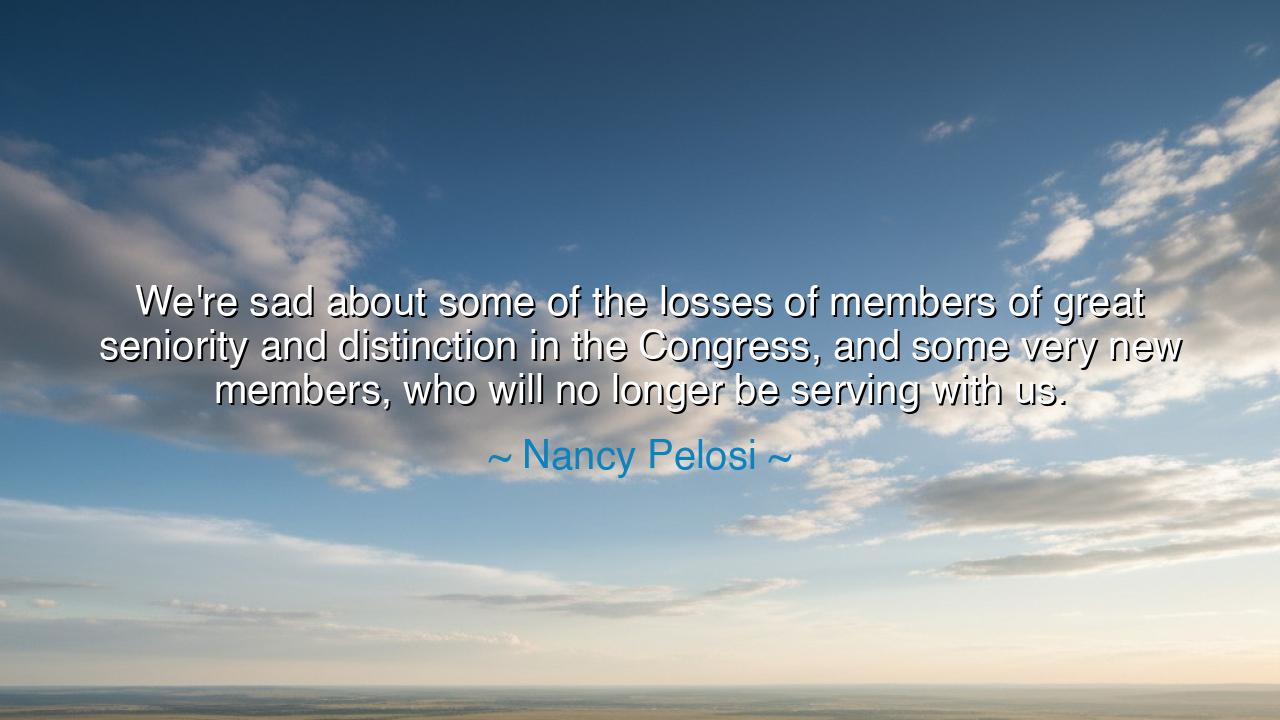
We're sad about some of the losses of members of great seniority
We're sad about some of the losses of members of great seniority and distinction in the Congress, and some very new members, who will no longer be serving with us.






Hear, O seekers of wisdom, the words of Nancy Pelosi, who in her role as steward of the people’s house declared: “We’re sad about some of the losses of members of great seniority and distinction in the Congress, and some very new members, who will no longer be serving with us.” Though spoken about politics and public service, these words reveal truths that touch every human life: the sorrow of change, the passing of leadership, and the eternal rhythm of renewal and loss.
Mark first the sorrow: we’re sad. In this, Pelosi acknowledges not only her own grief but the grief of all who serve. For in every gathering of mortals—whether a family, a village, or a Congress—there comes a time when companions depart. Some go after long service, seasoned in wisdom, others depart before their story has truly begun. In both cases, the ache is the same: a table once full grows emptier, and the song of the group is changed forever.
Next we must look upon the phrase: members of great seniority and distinction. Here is the lament for elders—those who bore the weight of years, who carried with them traditions, counsel, and the memory of battles fought long ago. When such figures depart, an emptiness is felt, for their wisdom is not easily replaced. Just as in ancient tribes the loss of an elder meant the fading of a living library, so in the halls of Congress the departure of long-serving members leaves behind silence where once there was experience.
Yet Pelosi does not speak only of the elders, but also of the very new members. Their loss carries a different sting—the sting of potential unrealized, of journeys cut short. They are like seedlings torn before they can grow to shade others. History shows us that both the old oak and the young sapling are needed to make a forest whole; so too are the experienced and the fresh voices necessary for a people’s council to thrive. Their absence, though from different causes, wounds the whole body.
Consider, as an example, the story of the Roman Senate. In its long life, Rome mourned the passing of great elders like Cato the Elder, whose counsel shaped generations, and also young men like Tiberius Gracchus, whose fiery vision was extinguished before its time. In both losses, Rome felt the weakening of its foundation. Pelosi’s words echo this timeless truth: the passing of leaders, old and new, leaves gaps that test the strength of the community.
The meaning, then, is clear: no body, however strong, is untouched by loss. To serve together is to one day part. Yet within the sorrow is also the call to renewal—to honor those who have left by taking up their work, by learning from their legacy, and by building anew where there is absence. For though companions depart, the cause endures.
So, dear listener, let this be your lesson: do not take for granted those who labor beside you, whether elders full of wisdom or newcomers full of hope. Honor them while they walk with you, and when they depart, carry forward their light. In your own circle—be it family, work, or community—speak gratitude, learn from the aged, encourage the young, and remember that loss, though painful, is the seedbed of growth. Thus shall you endure the changes of life, not in despair, but in strength, carrying the voices of those who have left into the work that lies before you.






AAdministratorAdministrator
Welcome, honored guests. Please leave a comment, we will respond soon